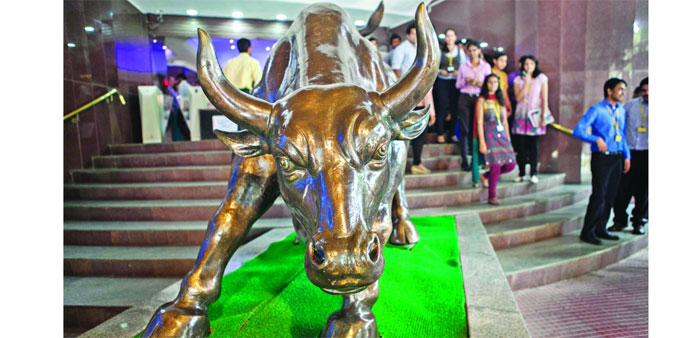Employees walk past a bronze bull statue as they exit the Bombay Stock Exchange building. A data compiled by Bloomberg yesterday showed overseas investors withdrew a net $1.5bn from local corporate and government bonds as of April 22.
Bloomberg/New Delhi
Foreigners are set to cut their holdings of India’s debt for the first time in five months, seeking to avoid losses should national elections fail to deliver a clear winner.
Overseas investors withdrew a net $1.5bn from local corporate and government bonds as of April 22, the biggest outflow since October, exchange data compiled by Bloomberg show. That contrasts with inflows to Indonesia, Thailand and Malaysia. India’s default risk is rising for the first time in three months as votes are cast before counting on May 16.
Global funds are turning cautious as opinion polls have inaccurately predicted the outcome of past elections. They poured a record $6.2bn into Indian debt last quarter as surveys showed the opposition Bharatiya Janata Party, which has pledged to curb inflation and spur investment, winning the most seats. The ruling Congress-led coalition faces a rout amid rising food costs, graft scandals and a slump in growth.
“Investors are looking to take some money off the table before the result as nobody can bet on that,” AS Thiyaga Rajan, a senior managing director at Aquarius Investment Advisors Pte in Singapore, said in an April 22 telephone interview. “It makes sense to take a slightly cautious view.”
Credit-default swaps insuring the notes of State Bank of India, which some investor consider a proxy for the sovereign, against non-payment for five years jumped 29 basis points since March 31 to 253, according to data provider CMA. They touched 222 on April 1, the lowest level since June.
The rupee weakened 2% this month as outflows pared this year’s net buying of Indian debt to $4.65bn, still the highest among seven Asian markets tracked by Bloomberg. The currency slumped 11% in 2013 as foreigners sold an unprecedented of $8.03bn of rupee bonds. It was little changed from April 23 at 61.11 per dollar on Friday, having advanced 1.1% this year. Financial markets in Mumbai were shut on Thursday for voting.
The outflows are also “probably” a result of the Reserve Bank of India’s decision to deny further foreign investment in government notes maturing within a year, according to BlackRock Inc, which managed about $4.32tn as of December 31.
In a bid to encourage longer-term flows, the RBI said April 1 that foreign portfolio investors can only buy government securities with residual maturity of at least one year. Existing holdings of treasury bills will be allowed to taper off upon their maturity or sale.
“The main flows into Indian bonds recently were short maturity, ahead of the elections, and in expectation of rupee appreciation,” Joel Kim, Singapore-based head of Asia Pacific fixed income at BlackRock, said in an April 15 e-mail interview. “With foreigners’ access to short-term paper closed, and no near term plans for inclusion of India into global bond indices, the question is how sustainable these flows will be? Especially post elections.”
This month’s outflows are due to technical factors and yields remain attractive, according to Societe Generale SA. India’s 10-year sovereign notes offered 642 basis points more than similar-maturity US Treasuries on April 8, the widest spread since December 2012, data compiled by Bloomberg show.
“Technical factors have driven these outflows, including some position-squaring after a good run,” Benoit Anne, head of emerging-market strategy at Societe Generale, said in an April 22 e-mail interview. While the election is a key risk, he added, “I am still quite constructive on Indian bonds. We recommend exposure to notes maturing December 2020.”
The yield on the benchmark 8.83% government bonds due November 2023 fell two basis points, or 0.02 percentage point, to 8.83% in Mumbai, according to prices from the central bank’s trading system. It has increased two basis points in 2014. The yield on the December 2020 notes fell three basis points to 8.95%.
Anne said he expects inflows to resume as global sentiment toward emerging markets has improved, and predicted the 10-year yield will drop about 50 basis points over the next three months. That compares with a median forecast for a decline to 8.50% by March 2015 in a Bloomberg survey of 10 banks and mutual funds this month.
India will sell Rs160bn ($2.6bn) of bonds at a weekly auction. Finance Minister Palaniappan Chidambaram announced in February a borrowing target of Rs5.97tn for the fiscal year that started April 1.
The government said last month it may borrow Rs3.68tn, or about 62% of the full-year target, in the April-September period. Concern that the increased supply will curb demand for existing bonds pushed the benchmark 10-year yield to 9.10% on April 7, the highest since November.
The BJP will win 226 of the 543 parliamentary seats up for grabs, according to the latest opinion poll conducted by Hansa Research for the NDTV channel that was published on April 14. Along with its allies, the party may win 275 seats, giving it a majority, it showed. An April 4 CNN-IBN poll forecast the BJP-led alliance to win as many as 246 seats, short of the 272 needed for a majority. India’s Election Commission on April 16 asked media to stop publishing such polls.
The Congress won in 2004 even after polls suggested the BJP would keep power, and in 2009, when most polls predicted a close fight, Congress won with the largest tally in 20 years.
“What we are seeing is profit-booking ahead of the key election result as opinion polls haven’t always been accurate in the past,” Bhanu Baweja, the head of emerging-market cross-asset strategy at UBS AG in London, said in an April 23 e-mail interview. “The market has been long Indian bonds, and we are now seeing moderating of some of those positions.”

